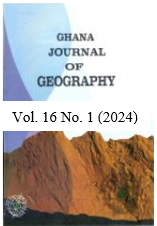Exploring the Nature of Road Safety Education in Basic Schools and School Children’s Travel Mode Options in Winneba, Ghana
Abstract
Road safety education among school children is a critical issue that needs to be addressed as African countries record more road traffic-related deaths and disabilities. Despite efforts to increase road safety education across various mediums, basic schools in Ghana have received little of such attention despite their role in socialisation. This study explored the nature of road safety education and school children’s travel mode opinions in Winneba. The study adopted a quantitative research approach which sampled 400 school children within Class 4 to 9 (Junior High 3) from 5 basic schools. Questionnaires were filled after class hours after receiving approval from school heads. Jamovi was used to analyse the data and presented using frequency, cross-tabulation and chi-square test of independence. The study found that walking constitutes a major travel option for children in Winneba as this mode comes at no cost. Even though schools constituted a primary source of knowledge, road safety education was not assigned to a dedicated subject teacher(s) and was seldom taught in school. The study found a significant relationship between the impact of road safety education and school children’s frequently used travel mode option. The study recommends efforts to dedicate road safety lessons to subjects like Social Studies and Our World Our People since such subject’s touch on Ghanaians’ daily living situations.




